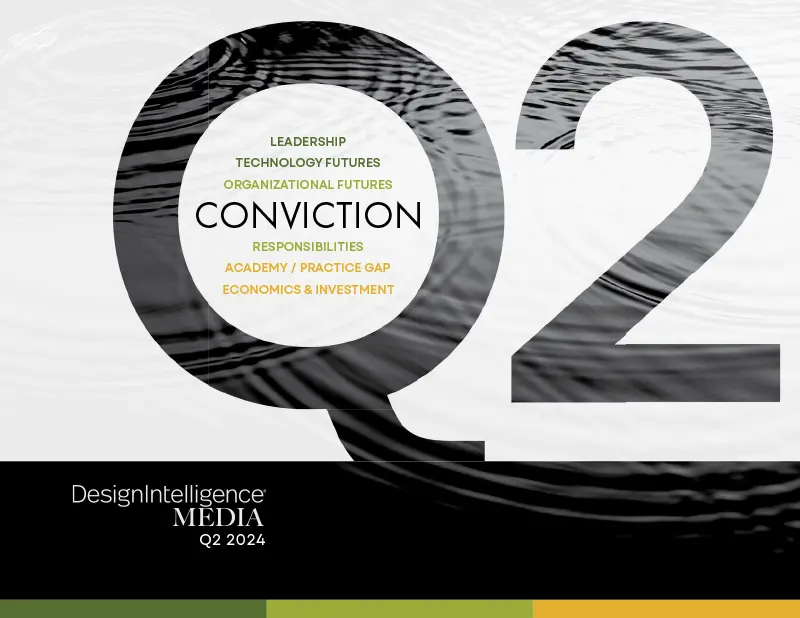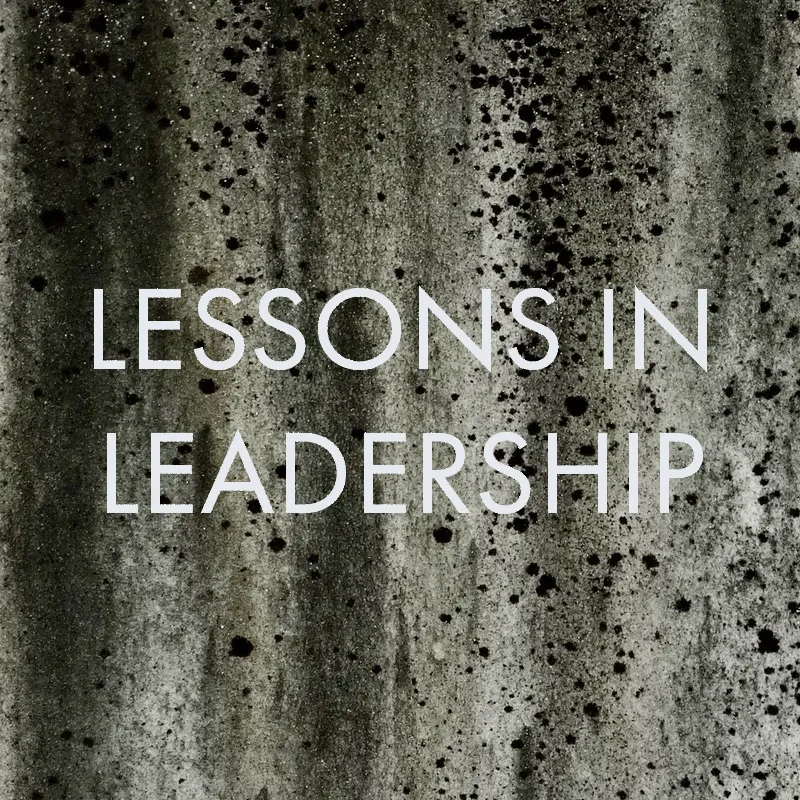
Context: Conviction
Michael LeFevre
Managing Editor, DesignIntelligence
July 3, 2024
This Q2 compilation of essays allowed contributors the freedom to approach a path and topic of their own choosing from one of six annual DesignIntelligence themes. They are:
-
Leadership
The Business of Design, Resilience -
Technology Futures
Artificial Intelligence, Applied Research, Innovation -
Organizational Futures
New Organizational Forms, Alliances, Work, Workplaces, Value Propositions & Business Models -
Responsibilities
Global / Regional / Local, Motivations & Incentives (Group & Individual), Housing, Homelessness, Society, Civility, Income Gaps, Climate Change Dynamics, Sustainability & The Environment -
Academy / Practice Gap
Trans industry & Transdisciplinary Collaboration, Professional Education, Development & Continual Learning, New Skills, Talent) -
Economics & Investment
Finance, fiscal responsibility, geopolitical issues
…to remain relevant and resilient.
Some chose to weave more than one theme into threads of their choosing. The common throughline in all this Quarter’s offerings? Conviction.
With writers free to choose their own subjects, a pattern emerged that saw them tackling topics they felt strongly about. Subjects for which they had conviction.
The results of such freedom yield a diverse slate of passionate pieces and cover the full range of our six themes, from leadership to technology, from organizations to professional responsibilities, and from the academy/practice gap to economics and investment.
In addition to our regular DI contributors, we invited a stellar cast of industry thought leaders. Each has something powerful to say. Something about forces and ideas they are obviously emotional about and deal with daily, likely over years. Specifically:
Esperanza Harper, Innovation Leader at LS3P, in her article, Embracing Responsibility, she challenges us to enable justice, equity, diversity and inclusion - by design.
Michael Monti, Executive Director of the Association of Collegiate Schools of Architecture, in his essay, The Promise: A Holistic, Values-Based Architectural Education, he lays the foundation and makes a convincing case for multi-dimensional architectural education - and accountability.
Charlie Cichetti, CEO of Skema, an AI-based software solution provider, challenges readers to take hold of AI’s power in his article, Leading the Charge.
Angela Watson, CEO of Shepley Bulfinch, a 150 year old national firm, takes us down memory lane into the firm’s archives, and into the future as she explores AI’s impact on communication and her firm’s design process. Her segment entitled, Communication in the AI Age in an interesting, vulnerably shared, introspective and honest look.
Jim Anderson, CEO of Dialog Architecture in Toronto, also opens his soul in giving us an open kimono view of his own AI experiment. In Before and After, in pursuit of a deeper understanding of AI’s leadership impact, he exposes his writing and thinking approach, and then turns the task over to AI, and shares the difference. Which is better? You decide.
With writers free to choose their own subjects, a pattern emerged that saw them tackling topics they felt strongly about. Subjects for which they had conviction.
And from the rollicking ranks of our regular DesignIntelligence crew of usual writing suspects, we offer:
Dave Gilmore, our president and CEO. In Values, Worldviews and Convictions, his decades of perspective on this triad of contexts displays his knowledge and passion for the subject.
Scott Simpson, our longest standing contributor, challenges late career and all practitioners to Like It or Not, when it comes to AI’s influence on practice.
From the UK, Paul Hyett has forcefully penned Time Is Running Out for Politics, in which he points to climate change urgency, collaboration and action and asserts the need for connections between the academy, the profession and political factions.
Paul Finch follows with Collaboration: Winners Without Losers, a refreshing, retrospective look at Hollywood as a model for synergy.
DeeDee Birch, in her science-based study, Neuroarchitecture as Healing Design in a Changing Climate, connects brains, bodies and the built environment as means of facilitating climate change action.
Bob Fisher shares his interview with alternative career professional Rico Quirindongo in search of motivations to grow our impact through civil service in his article, To Serve?
Bob Hughes importantly grounds us by looking at the numbers in his article, The Eagle Has Landed, a mid-year economic review.
Lastly, my own written product relies on an unconventional examination of two unlikely sources in search of conviction and how to apply it. In, The Power of Belief, I consider college football and sports immense power to generate unified belief, and temper that with a frightening anecdote about task blindness. What do we believe in?
We hope you digest these investigations, and that they might connect some of your own convictions – and prompt commensurate actions.
Enjoy.
Michael LeFevre, managing editor
Michael LeFevre, FAIA emeritus, managing editor, DI Media Group; principal, DI Advisory; senior fellow, Design Futures Council
2024 Q2 Book Contributors
Context: Conviction - Michael LeFevre
Values, Worldviews and Convictions - Dave Gilmore
The Power of Belief - Michael LeFevre
Like It or Not ... - Scott Simpson
Time Is Running Out for Politics - Paul Hyett
Collaboration: Winners Without Losers - Paul Finch
Communication in the AI Age - Angela Watson
Embracing Responsibility - Esperanza Harper
The Promise: A Holistic, Values-Based Architectural Education - Michael Monti
Neuroarchitecture as Healing Design in a Changing Climate - DeeDee Birch
To Serve? - Bob Fisher & Rico Quirindongo
Before and After - Jim Anderson
Leading the Charge - Charlie Cichetti
The Eagle Has Landed - Bob Hughes




